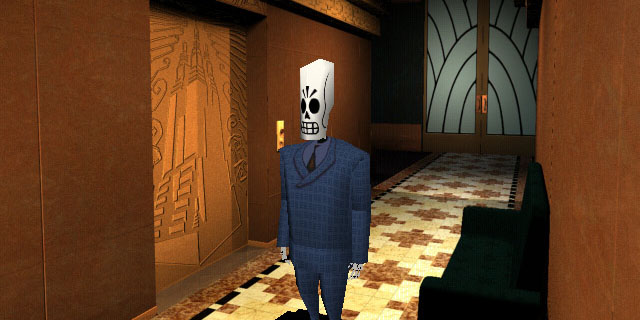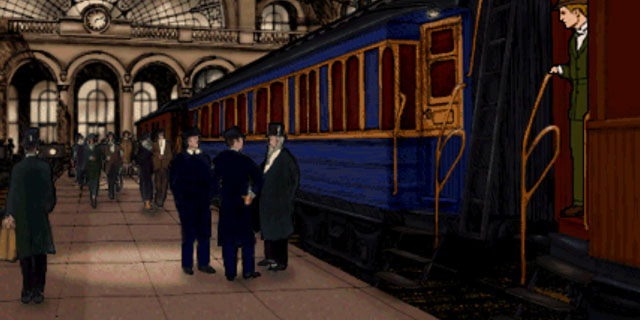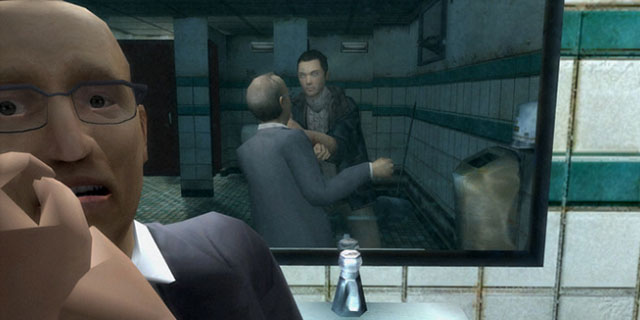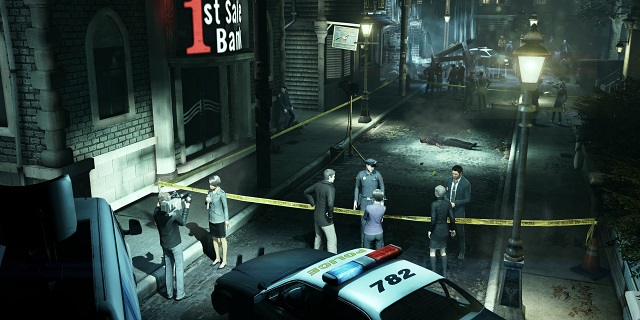
It’s a column shake-up! Andrew Passafiume steps away from New Game+ for a week to explore his emotions in Serotonin.
I’m a sucker for good mystery novels, especially pulpy noir stories. I grew up reading Joan Lowery Nixon and eventually graduated to the big leagues: Raymond Chandler, James M. Cain and many others. This is why I found myself eagerly anticipating the release of Murdered: Soul Suspect. I wasn’t optimistic about it, but it gave me the vibe of a cult classic in the making.
Playing through it made me realize why mysteries in games are even more satisfying than novels or films. Those stories are about the mystery, sure, but you are only a mere witness. Games, such as Murdered, make the act of solving these mysteries compelling in and of themselves. Sure, you want to know what’s really going on, but being tasked with figuring it out on your own is what makes the mystery truly shine.
Many adventure games specifically focus on this element, but few capture the feeling of a real noir-style mystery quite like Grim Fandango. It’s a fantastic mix of genres and styles, creating a title that is far and away one of the best adventure games of that era. It still has plenty of the silly adventure game puzzles one might expect from games like it, but its style and writing really give it a different vibe from most other titles in the genre.

It’s a personal favorite for many reasons, but it really did feel like I was solving a grand mystery, not just a set of puzzles that allowed me to move on to the next story moment and the next set of puzzles. It brought me back to those novels I grew up reading, but surpassed them by including an enigma at the heart of its story you had to slowly pick apart until the answer was staring you in the face. Grim Fandango’s ultimate conclusion was fantastic, but you weren’t in it for the solution, piecing it together yourself satisfying enough. That’s the sign of a good mystery.
I don’t feel many games scratched the same itch Grim Fandango did after its release, but I kept trying a multitude of titles in the interim. Some had worthy moments, such as Hitchcock: The Final Cut and Still Life, but they still fell back on adventure game tropes a little too much to stand out. Seriously, Still Life features a puzzle in which you need to bake cookies. Nothing screams murder mystery more than baking cookies, I suppose.
Then I began to dig back and check out older games based on some recommendations. I tried a variety of them, including Blade Runner and the classic Tex Murphy title Under a Killing Moon, but they didn’t match what I was looking for either. They felt like typical adventure games with mysteries somewhere in the background. You weren’t solving a case; you were solving puzzles to help the main character solve the case. They lacked something that makes mysteries like Grim Fandango so engaging. This is when I remembered a lesser known title from Prince of Persia creator Jordan Mechner called The Last Express.

I played through it with a friend when it first came out, not really able to appreciate it, but absolutely adored it when I revisited it years later. What makes The Last Express work over some of those others is its non-linear approach to detective stories, complete with a variety of choices which will ultimately lead you down the path to a multitude of different endings. Its large cast of characters, original setting and memorable twists make it one of the few mystery adventure games that take advantage of the genre tropes while consistently surprising you along the way. My second (and third, forth, and fifth) times through the game were similar in some respects, but led me to many different interactions and scenarios. I was hooked.
Not many games fill the same mold as The Last Express, not even Grim Fandango, making me pine for even more mystery games that I could sink my teeth into. I would revisit both of these games from time to time, marveling over their strengths in the process. Grim Fandango’s hilarious writing, inventive puzzles and memorable characters were always a delight, and The Last Express’s central mystery and non-linear design made each experience unlike the last.
Eventually, thanks to a random Internet search, I stumbled upon a soon-to-be released game called Indigo Prophecy. It’s a murder mystery, but it was less about whodunit and more about how it happened. The central character, Lucas Kane, finds himself in a bizarre (and dangerous) situation when he wakes up in a diner bathroom after having murdered a random patron. The twist? He wasn’t in control of his body when it happened.

From there, you control Lucas as he attempts to clean up the mess as best as he can and leave the diner without drawing any attention to himself. Control soon switches over to two detectives who investigate the murder, gathering clues along the way. The better you handled the situation as Lucas, the less evidence the police have linking him to the crime. Controlling both Lucas and the detectives, Carla and Tyler, means you have to figure out the mystery from two different perspectives. The detectives are on the hunt for the killer, while Lucas attempts to figure out what happened to him in that diner.
The game does have plenty of silly moments, especially near the end, but having full control over two sides in the story, even if they are both eventually led in the same direction, makes for a compelling mystery. I haven’t gone back to it in a long time, so I know full well it might not hold up at all, but I remember it being the first mystery since I revisited The Last Express a few years prior that really grabbed me from start to finish.
Since then, a few titles grabbed my attention for the same reason, including Quantic Dream’s follow-up to Indigo Prophecy, Heavy Rain and a little game called L.A. Noire. Yeah, sure, L.A. Noire’s interrogation system was kind of broken, and Heavy Rain‘s twisted narrative featured a multitude of plot holes, but I couldn’t help but love them. It might be because of how few and far between it seems between new titles like these. When a new one is released, you won’t catch me playing anything else until that mystery is solved.

That’s why Murdered stood out to me when it was first revealed. Like Heavy Rain and L.A. Noire, it was a unique take on an otherwise-standard mystery. Best of all, it truly felt like one of those old noir novels I read growing up. It was true to those themes and motifs while keeping one foot firmly planted in the supernatural. It was a love letter to adventure games, murder mysteries and noir, remaining faithful to its inspirations from start to finish.
It comes down to wanting to be the detective, wanting to put the clues together and have those “a-ha!” moments. Witnessing a detective story play out in front of you can be satisfying, but becoming the detective, allowing yourself get your hands dirty and come out with a better understanding of a complex mystery is what really grabs me and, as it turns out, many others. I guess it’s true what they say: everybody loves a good mystery.



















